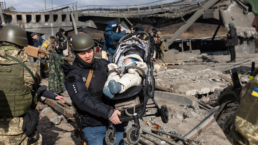The United States doesn’t have much to say about Ukraine, because it claims Russia is unwilling to talk. It’s up to our movements to demand more.
By Phyllis Bennis, The Progressive Magazine
As the war in Ukraine grinds on, some things remain clear: The human cost of this war is staggering, and Ukrainian civilians, of course, are paying the highest price. Thousands of lives have been lost, thousands more have been wounded, millions have been displaced, and towns and cities have been destroyed.

What else do we know? We know that the United States and NATO have been provoking Russia for years by, among other things, expanding membership among nations close to the Russian border. We know that Russia had choices about how to respond to those provocations, and it chose to respond with aggression.
We also know that Western responses to the war in Ukraine—constant coverage of the human cost, the recognition of Ukraine’s right to self-determination, and governments’ support in protecting the safety and dignity of refugees—have shown us a powerful model of how to respond to all wars, and how to care for all refugees. At the same time, those Western responses, however laudatory in Ukraine, have simultaneously reflected a deep hypocrisy and enormous double standard rooted in racism and xenophobia when refugees from other countries are involved.
There’s something else we know about the war in Ukraine: It is far more dangerous internationally than Washington’s decades-long global “war on terror.” This war has the potential to escalate to a nuclear exchange between the world’s biggest nuclear powers. The risk is less a calculated decision to use nuclear weapons than the fact that wars take on lives—and deaths—of their own, meaning that an unanticipated mistake by either side could quickly spiral out of control.
Recent Posts
‘Unconstitutional. Unethical. Authoritarian.’ ICE Bars Millions Of Immigrants From Bond Hearings
July 18, 2025
Take Action Now One watchdog said the new policy “seems like a blatant attempt to stop them from exercising their right to due process.”……
Americans Are Not Nearly Alarmed Enough About Climate Change
July 18, 2025
Take Action Now Americans still don’t comprehend how imminent, dangerous, and far-reaching the threat is—and journalists are partly to blame.By…
The IRS Is Building A Vast System To Share Millions Of Taxpayers’ Data With ICE
July 17, 2025
Take Action Now ProPublica has obtained the blueprint for the Trump administration’s unprecedented plan to turn over IRS records to Homeland Security…
Israel’s Sudden Assault On Syria Is Unchecked Aggression
July 17, 2025
Take Action Now Jerusalem is bombing Damascus and threatening al-Sharaa’s rule, while Washington was hoping to help the nascent government on…




